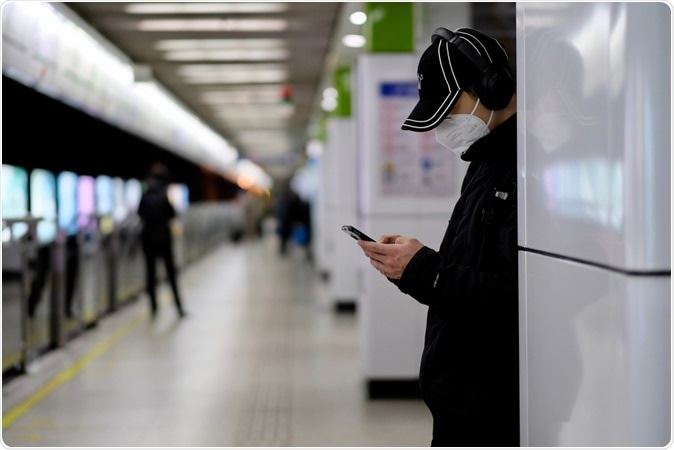Since the start of the novel coronavirus outbreak, now officially called coronavirus disease (COVID-19), surgical mask prices have skyrocketed as panic ensues around the globe. Retail giant Amazon has warned against sellers marking up their prices, while Facebook has announced measures against misleading coronavirus adverts and information.
Amid the spread of the deadly coronavirus, which has affected 46 countries, infected more than 82,000 people, and killing 2,800 people in two months, there has been a shortage of surgical masks in most countries. This has prompted several suppliers and vendors to mark up pricing on these products.

Shanghai/China-Jan.2020: COVID-19, man wearing surgical mask at railway station platform in Shanghai. Image Credit: Robert Wei / Shutterstock
Overpriced products
Amazon is doing something about it and warns that those who mark up face mask prices could be 'booted' from the site.
Further, the online marketplace emphasized to sellers not to post listings that claim to help stop the spread of the coronavirus, including treatments, cures, or remedies. Among the products already removed from listings for spray disinfectants and some surgical face masks. Some sellers removed their unapproved medical claims, and their products were reinstated on the website.
Amazon also modified the marketplace when a customer searches for COVID-19 or coronavirus, and other coronavirus-related content, the website will show the advisory directing users to the Centers for Disease Control and Prevention (CDC) website.
The link, which states, "Learn more about Coronavirus protective measures," will help educate people on how to protect themselves from the coronavirus outbreak adequately.
Misleading ads and information
Facebook has also taken the necessary steps to make sure all information about the coronavirus on the social media platform is accurate and legit. Facebook said it would remove content with conspiracy theories and false claims about the coronavirus.
Facebook is banning ads that promise to prevent, cure, treat, or otherwise incite panic around COVID-19, which is caused by the novel coronavirus. The social media platform also applied the same modifications for its Marketplace platform, filtering products that provide false and unapproved medical claims.
Facebook also said it supports the World Health Organization (WHO) 's efforts, by stopping ads for products that imply a shortage of supply, or a guarantee for a cure or prevention. Some of the posts banned were those claiming that face makes are 100 percent guaranteed to prevent the spread of the deadly virus.
"Our global network of third-party fact-checkers are continuing their work reviewing content and debunking false claims that are spreading related to the coronavirus. When they rate information as false, we limit its spread on Facebook and Instagram and show people accurate information from these partners. We also send notifications to people who already shared or are trying to share this content to alert them that it's been fact-checked," Facebook said on its website.
Facebook also said it would start removing content with false claims and those which can cause harm to people who believe them.
"We are focusing on claims that are designed to discourage treatment or taking appropriate precautions. This includes claims related to false cures or prevention methods — like drinking bleach cures the coronavirus — or claims that create confusion about available health resources," Facebook added.
Hashtags used to spread false claims and misinformation on Instagram will also be removed.
Global situation
The coronavirus disease (COVID-19) outbreak is spreading rapidly, and for the first time, the number of new infections in the last 24 hours surpassed that in China, the source of the virus.
The novel coronavirus has originated in a seafood market in Hubei province in China, which has reported the highest number of infections and deaths. Hubei province has reported 65,596 infections and 2,641 deaths.
Globally, of the 82,164 confirmed cases of the coronavirus, 32,872 have recovered a time of writing. The remaining patients are still admitted and undergoing treatment.